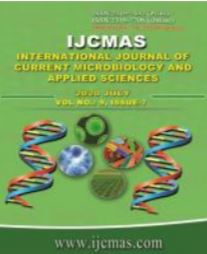


 National Academy of Agricultural Sciences (NAAS)
National Academy of Agricultural Sciences (NAAS)

|
PRINT ISSN : 2319-7692
Online ISSN : 2319-7706 Issues : 12 per year Publisher : Excellent Publishers Email : editorijcmas@gmail.com / submit@ijcmas.com Editor-in-chief: Dr.M.Prakash Index Copernicus ICV 2018: 95.39 NAAS RATING 2020: 5.38 |
Quality seed of paddy has tremendous contribution to the Indian economy. But ageing process during storage reduces germination (< 80.0%) and viability so that the seeds could not meet the minimum seed certification standards. Priming that is an easiest, economical and environmentally friendly method could be adopted by farmers and seed producing organisations to increase germination to the level of minimum seed certification standards. The objective of the present investigation was to increase germination and viability of naturally aged paddy breeder seeds by following the priming treatments. Naturally aged breeder seeds of four different varieties of paddy were primed with GA3 (100 ppm), KNO3(2%), KCl (2%) and tap water for 24 hours. Laboratory as well as field tests were carried out in a completely randomised design with five replications. Experimental results revealed that priming of naturally aged paddy seeds with GA3, KCl and H2O increased germination by 8.3 %, 11.2% and 11.4% respectively as compared to unprimed seeds except KNO3 which had a detrimental effect on germination. All the priming treatments have positive effects on germination energy, shoot length, root length, seedling length, seed vigour indices and field emergence except KNO3. Efficacy of priming treatments was expressed in terms of germination stability index (GSI) and the highest was achieved by hydro priming followed by hormonal priming GA3 and halo priming agent KCl. It is concluded that hydro priming may be the best treatment in accelerating the germination of naturally aged paddy seeds up to a minimum seed certification standard particularly for the seeds having germination above 70% but below 80%. Further, it is a simple and inexpensive approach that could be easily adopted by farmers and the seed producing organizations.
 |
 |
 |
 |
 |